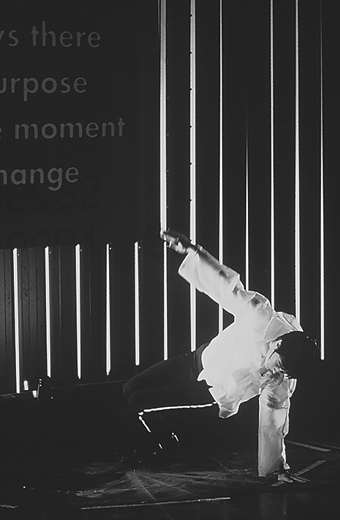contain.her

Anna Sabiel, contain.her
contain.her is part of the enterprising Performance Space-Metro Screen New Narratives project (see RealTime 25, “Vertical Hold”, p13) and it’s the most engaging and convincing of the three experiments, regardless of some inevitable work-in-progress awkwardness. Being so used to seeing Anna Sabiel suspended by wires in great, darkened spaces, triggering sonic compositions with delicate counter-weighted moves, it was odd to see her earthed, mapping out a grid with a plumb line on The Performance Space floor against an exquisite triptych of large glowing container walls with embedded screens. But Sabiel has the beginnings of a potent movement vocabulary (the show aspires to “journey from the central notion of the body as container through the realm of exchange and to the sea”), just as there is the first stage of a relationship between her and onstage collaborator Heather Grace Jones who speaks her own text (live, recorded, both or triggered by slaps to the body). Jones poignantly evokes a maritime-worker father in text and, through the other media of the work, reaches out from the personal, to the mythic to the blunt political reality of recent maritime union and stevedoring industry disputes (images of the handshake, the voices of unionists and politicians). From the beginning of the performance, footage of a working dock (and the sonic rhythms of its labours) alternates regularly with live images of the audience on the outer screens. The result is mesmeric—like being absorbed into the repeated rhythms of a labourer—mysterious but also quite concrete in Sabiel’s hauling and laying out of rope (I wanted thicker, heavier rope) and in the engagement with his body. Jones’ text refers to the father’s back at one point and immediately on the centre screen we see Sabiel’s naked back in a simple but evocative recurrent action, the arm swung out and reaching behind to slap the shoulder blade. There are other images and lines of development and overlaps (the rope image is onstage-real but also flickers tautly across screen images and texts). One image merges traditional shadow play and computer animation. Sabiel rolls under the central container wall to reappear as a distant shadow moving towards us, almost fills the screen and suddenly falls; soon she is joined on the screen by an animated naked female figure slipping out of sync with a green-line grid of herself and somersaulting into her own fall. In a strange moment 3D animation and 2D shadow dance together while a spooky little ostinato works its way into the space contain.her is a wonderful reverie, a net of recurrent images and moves and their transformations—the formal opening gridding of the floor, for example, becomes in the end an outsize plumb weight, a cone swinging across the stage pouring out a thin line of sand in free lines, circles, curves and slashes. The images that run parallel and in counterpoint to and into the performances are by digital media designer Sarah Waterson (an almost on-stage presence working in view of the audience) with the aid of the invaluable programming lingo provided by collaborator Brad Miller. Thankfully, contain.her doesn’t take the notion of ‘narrative’ too literally, and opens up a space for its audience, for reflection and visual pleasure, and for the enjoyment of the musicality of its shape and the rhythms of the bodies it invokes, for the intimate poetry they speak and the sharp reminder of the changing politics of the workplace. KG
contain.her, digital media design Sarah Waterson; performance Anna Sabiel; text and performance Heather Grace Jones; director lingo Brad Miller; lighting design Shane Stevens; movement consultation Nikki Heywood; New Narratives, The Performance Space, Oct 2 & 3
RealTime issue #28 Dec-Jan 1998 pg. 27






